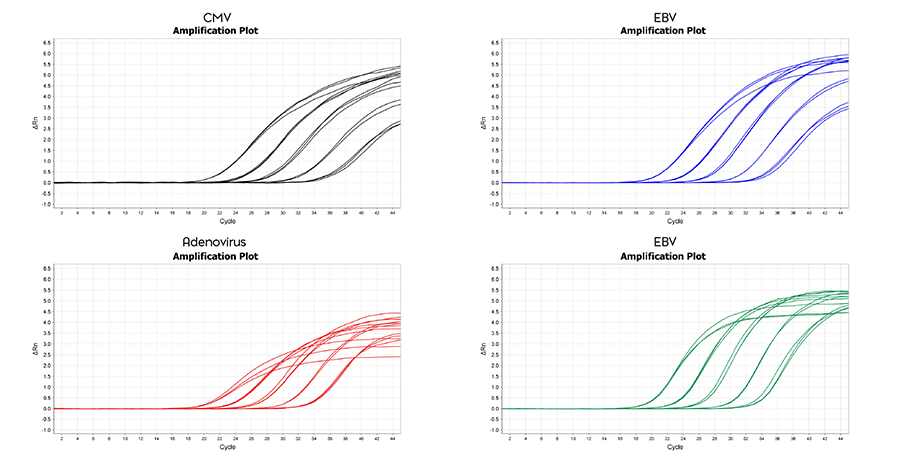Lyo-Ready qPCR Buffer w/o Excipients, 4x
Molecular diagnostic tests are progressively moving towards lyophilized. There are several advantages for this, including room temperature shipping and storage, extended shelf-life, and increased flexibility in the sample volume. In order to be compatible with drying, however, enzyme preparations must be glycerol-free and include specialized excipients that preserve the mixture as it is exposed to freeze-dry, vacuum and dehydration.
Have questions about a product?
Contact us to learn more about Meridian’s molecular or immunoassay reagent portfolio. We want to hear from you!
Powerful multiplexing capacity

Three viral sequences, Cytomegalovirus (CMV) Adenovirus, Epstein-Barr Virus (EBV) and a DNA Extraction Control were amplified with equal efficiency from synthetic DNA templates with -Ready™ qPCR Mix in a quadruplex qPCR probe assay. The result illustrates that all three viruses were amplified with high efficiency and sensitivity, demonstrating the ability of Lyo-Ready qPCR Mix to detect low-copy number DNA targets simultaneously from a single sample.
Lyo-Ready qPCR Buffer w/o Excipients, 4x, MDX061
Glycerol-free qPCR reaction buffer that is designed to allow formulation optimization to freeze-drying methods by excipients selection.
Documents & Resources
Description
Lyo-Ready qPCR Buffer w/o Excipients is a glycerol-free qPCR reaction buffer that allows formulation optimization to freeze-drying methods by excipients selection. In order to produce room temperature lyophilized qPCR reagents, lyo-excipients, a lyo-compatible Taq DNA polymerase (such as MDX011 or MDX015), assay-specific primers, and probes are added to Lyo-Ready Buffer for subsequent freeze-dry.
Specifications
| Description | A glycerol-free qPCR reaction buffer that is designed to allow formulation optimization to freeze-drying methods by excipients selection. In order to produce room temperature lyophilized qPCR reagents, lyo-excpients, a lyo-compatible Taq DNA polymerase, assay specific primers and probes are added for subsequent lyophilization. |
| Concentration | 4x |
| Appearance | Clear, colorless solution |
| Application | Fast qPCR |
| Sample type | cDNA, DNA |
| Presentation | 1 vial |
| Storage | -20 °C |
| Mix stability | See outer label |
| Consistency | ± 0.5 Ct variance between test and reference sample |
| DNA Contamination | None detected in PCR amplification with traces overlay with the negative control on E. coli and mouse genomic DNA specific targets. |
| DNase Contamination | No detectable degradation |
Catalogs & Brochures
Reagent Solutions for Molecular DiagnosticsReagent Solutions for Molecular Diagnostics
Master Mixes for Molecular Ambient-Temperature Stable AssaysMaster Mixes for Molecular Ambient-Temperature Stable Assays
FAQs: Lyo-Ready qPCR Buffer w/o Excipients, 4x
Slope of standard 10-fold dilution curve indicates qPCR efficiency. The efficiency of the qPCR should be between 90–110% (−3.58 ≥ slope ≥ −3.1). If the efficiency is greater than 100%, this indicated inaccurate sample and reagent pipetting, if it is less than 100%, this indicates your samples may contain PCR inhibitors or your qPCR primer and/or probe design may not be optimal.
Yes, reaction conditions are the same and they will produce the same Ct values, even with multiplex qPCR assays. This means that the liquid mixes can be used to create SOPs if you do not want to lyophilize and then later if lyophilization is required (for example to increase sensitivity), the SOP can be updated for lyophilization, it does not require completely new SOPs to be written.
Many fluorescent qPCR primer- and probe-based chemistries have been devised and are available from different commercial vendors for molecular diagnostic tests, the two most used are:
• Hydrolysis (TaqMan) probes. The main advantages of using hydrolysis probes are high specificity, a high signal-to-noise ratio, and the ability to perform multiplex qPCR reactions. The disadvantages are that the initial cost of the probe.
• Molecular beacons. Molecular beacons are highly specific, can be used for multiplexing, and if the target sequence does not match the beacon sequence exactly, hybridization and fluorescence will not occur. Unlike hydrolysis probes, molecular beacons are displaced but not destroyed during amplification and can be used for melt curve analysis if necessary. The main disadvantage is that they are difficult to design, requiring a stable hairpin stem that is strong enough that the molecule will not spontaneously fold into non-hairpin conformations but not be too strong, or it may not properly hybridize to the target.
The Lyo-Ready qPCR Buffer w/o Excipients, 4x has some inhibitor tolerance, but for amplification from crude lysates or inhibitor-rich samples we recommend using are optimized Lyo-Ready Specimen-specific™ (blood, saliva, urine, stool, and plant) qPCR and LAMP mixes.
Following lyophilization in the presence or absence of primers and probes, the Lyo-Ready qPCR Mix is stable for a minimum of 24 months at ambient temperature (17 – 23 °C). Following rehydration, the assay reproducibility, sensitivity, and robustness will be the same as for a freshly made liquid mix, making the mixes ideal for point-of-care molecular diagnostic tests and microfluidic qPCR devices.
No, our lyo-excipients are proprietary, if you require a buffer containing lyo-excipients, we have the Lyo-Ready qPCR Buffer, 2.5x (MDX022).
Get In Touch With A Specialist
Have questions about a product? Want to learn more about Meridian’s molecular or immunoassay reagent portfolio? We want to hear from you!